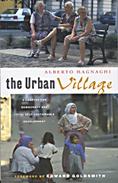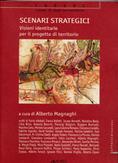regulation outskirts & suburbs strategic planning settlements Communication ifau2018 urban market local development ricerca collaborative urban design cities brownfields urban growth social practices citizenship parks special news identity landscapes habitability job urban design conferences agriculture città storica
The Urban Village
A charter for democracy and local self-sustainable development
edited by Aberto Magnaghi
Foreword by Edward Goldsmith
When first published in Italy, this book sold out in months. It stirred much media interest and was widely welcome across the political spectrum and scholarly circles. Now available in English in an update version, The Urban Village introduces the concept of self-sustainable local development, based on each locality's territorial specificities and traditions. After exploring the significance of local development in all its political, social and technical dimensions, Professor Magnaghi sets out a concrete vision for a new urban regional "utopia". He proposes, in addition to conventional indices of wealth and income, other criteria of social progress - including quality of life, social solidarity, and the development of non-commercial caring relations. Only when local communities value their local heritage, he argues, and build themeselves on a basis of local economic self-government, will they be able to resist the colonization and marginalization that globalization so often inflicts on them.
At a time when the idea of the local, the demand for genuine decentration capable of building effective community-level self-governing institutions, innovative democratic experiments, and ecological sustainability are all attracting more public interest, Alberto magnaghi's blend of theoretical thinking and practical proposals is likely to prove a source of inspiration for politicians, planners and citizens wrestling with the challenge of building urban and rural communities.
CONTENTS
Forewor
Preface by Edward Goldsmith
Introduction
PART 1: THE TERRITORIALIST APPROACH: TOWARDS LOCAL SELF-SUSTAINABLE DEVELOPMENT
1.The metroplis form and deterritorialization
• Liberaton from the contraints of territory: a short-term and barely sustainable historical event
• The morphogenesis of the contemporary metropolis: hypertophy and topography
• Fordization and deterritorialization
• From the factory city to the post-Forsdist city: continuous deterritorialization
2. Beyond the metropolis form
• Is the metropilis form irreversible?
• The new deveopment-related poverties
• The rebirth of the territory
3. The territory is not a beast of burden
• The functionalist approach or the theory of ecocompatibilty
• The envirnmentalist and biocentric approach
4. The territorialist approach
• Caring for the human environment
• Interpreting long-term identity
• Enhancing the identity of places
• Making local society
• From sustainability to sustainabilities
5. Local self-sustainable development
• "Development": from economic growth to well-being
• "Local": place as heritage
• "Self-sustainability": reuniting dweller and producer
6. The agents of change
• Opposing energies
• Bottom-up globalization: from a network of protest to caring networks of local societies
• The social composition of the new movements: from class consciousness to place consciousness
• The inurgent city: towards the public space of indifferences
• New community practices
• Local administrations and governing the economy: from marginality to centrality
• Possible convergence between institutional policies and social practices
7. The statute of places
• Territorial heritage and resources
• Definitions of "the statute of places"
• Identity of place: description, interpretation and representation
• Drafting the statute
• An initial model of the statute and its parta
• A planning process scheme for local self-sustainable development
PART 2: VISION OF A STRATEGIC SCENARIO
Promise
Concrete utopia and stratecig scenarios
• Recovering the role of utopia
• The proposed strategic scenario
• Scenario and planning
Project fro open spaces: the landscape of a new farmers
• The territorial ecosystem
• Territorial ecosystems and agriculture
• The producers of the landscape and environment
Cities of villages, cities of cities, network of cities
• Redefining the limits of the city
• Producing complexity
• Establishing the primacy of a city dor dwelling
• From the metropilitan city to the city of villages
• From the metropolitan region to the urban bioregion
• An example of the territorialization of rare services: the regional university system
• The central role of places with high territorial and environmental territory
• A hill civilization
The New Municipium
• The municipalities' new tasks in the shift towards self-goverment
• The Charter for a New Municipium
• Alternative globalization: new institutes of democracy, ethical economics, the new city-rural world alliance and fair trade between regions
• Stages in the consistent process
• The actors in the constituent process: ethical and fair trading versus the commercial and profit-making economy
• Appendix: Charter for a New Municipium
Towards the construction of the urban village:
• from the hypermarket to marketing networks for local products
• from the supermarket to the hypermarket: a further step towards unsustainable development
• Is the road from the supermarket to the hypermarket irreversible?
• Small retailers as a driving force for local development
Local projects and the South of the world:
• from co-operation to the development of the fair trade
• Changes in approaches to co-operation
• New co-operation, new problems
The local project: summing up a political vision
• Making local society
• From class conscousness to place consciousness
• The statute of places: a "constitutional" pact to develop the territorial heritage
• New statutes of citizenship
• The new municipium to "govern" the local project
• Towards bottom-up globalization
REFERENCES
INDEX
ABOUT THE AUTHOR:
Alberto Magnaghi: Professor of Land Use Planning at the University of Florence and leader of a nationwide research project to explore the importance of Italy's local heritage for endogenous development in the country's various regions. Besides many academic publications, he is the author of The Charter for a New Municipium that was presented at the World Social Forum in Porto Alegre in 2002.
Related articles:




Planum
The Journal of Urbanism
ISSN 1723-0993
owned by
Istituto Nazionale di Urbanistica
published by
Planum Association
ISSN 1723-0993 | Registered at Court of Rome 4/12/2001, num. 514/2001
Web site realized by ChannelWeb & Planum Association | Powered by BEdita 3


